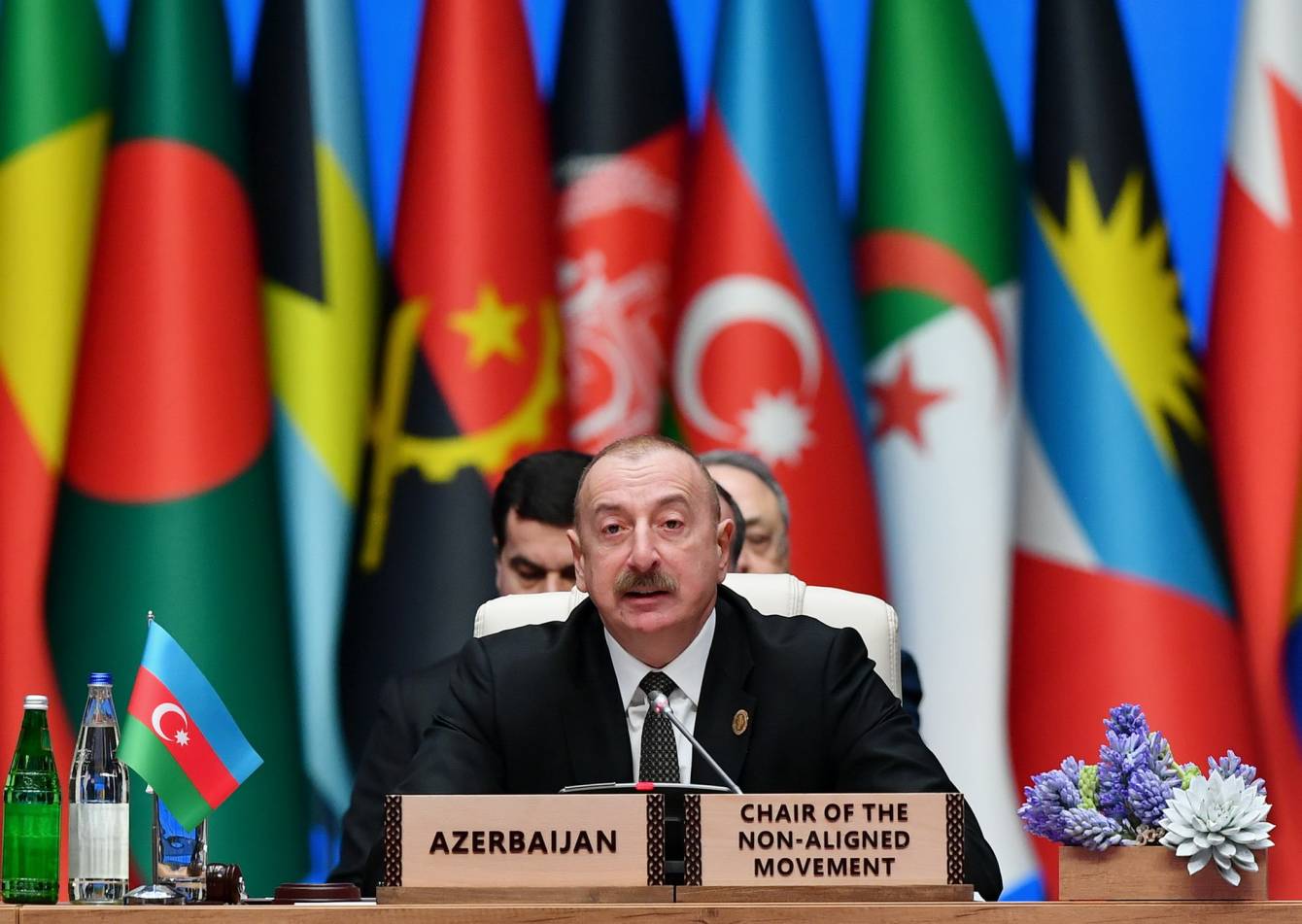President Ilham Aliyev has expressed his views on the waning influence of the United Nations Security Council (UN SC) as a supreme council on global affairs amidst the current reshaping of the world order, characterized by the most serious East-West confrontation since the end of the Cold War.
According to the President of Azerbaijan, reforms are needed for the Security Council to regain its status as an influential decision-maker. The statement was made during the Summit of the Non-Aligned Movement (NAM) on Response to Covid-19 held in Baku, Azerbaijan, which was attended by heads of state and government from almost 70 countries.
“UN Security Council is reminiscent of the past and does not reflect the current reality. The composition of the Security Council should be expanded to make it more representative and more geographically fair,” President Aliyev said, explaining his proposal.
“One permanent seat should be given to the Non-Aligned Movement, and the country holding the position of chair of the Movement should have this seat on a rotating basis. I call on NAM member countries to start consultations on this issue and present their views to the relevant UN Committee. We also support the allocation of permanent seats for Africa in the Security Council,” he added.
The United Nations Security Council is widely regarded as the preeminent global organization responsible for maintaining international peace and security. Among its functions are facilitating negotiations, imposing sanctions, and authorizing the use of force, including the deployment of peacekeeping missions. Nonetheless, the Council has been subject to constant calls for reform, particularly in relation to its permanent member board, to enhance its capacity to address contemporary challenges.
The UN SC consists of 15 members, with five permanent members (China, France, Russia, the United Kingdom, and the United States) and ten non-permanent members elected for two-year terms by the General Assembly. The permanent members hold veto power and play a significant role in decision-making. However, there have been persistent demands to reform the Council's structure, particularly by expanding the number of permanent seats.
According to President Aliyev, the UN SC is “inefficient” in tackling global challenges, even those highlighted in its own adopted resolutions. He further cited four resolutions of the UN SC from the initial years of the Armenia-Azerbaijan conflict in the latter’s Karabakh region.
“Some Security Council resolutions have been implemented within days. However, in the case of Azerbaijan, Armenia ignored the four Security Council’s resolutions demanding immediate and unconditional withdrawal of its armed forces from the territories of Azerbaijan for almost 30 years,” the Azerbaijani president said.
He further said that “Azerbaijan itself restored its territorial integrity and historical justice by military-political means and enforced the Security Council resolutions’ implementation.”
Armenia and Azerbaijan were in an armed conflict for nearly 30 years over the Karabakh region, which is an internationally recognized territory of Azerbaijan. Armenia launched full-blown military aggression against Azerbaijan following the Soviet Union’s dissolution in 1991. The bloody war lasted until a ceasefire in 1994 and saw Armenia occupying 20 percent of Azerbaijan’s internationally recognized territories. Over 30,000 Azerbaijanis were killed, and one million were expelled from those lands in a brutal ethnic cleansing policy conducted by Armenia.
The United Nations Security Council adopted four resolutions in 1993 demanding the immediate withdrawal of the occupying forces from Azerbaijani lands and the return of internally displaced Azerbaijanis to their ancestral lands. However, the documents remained unfulfilled for nearly 30 years until 2020 when the next bloody war erupted between Armenia and Azerbaijan.
On September 27, 2020, the decades-old conflict took a violent turn after Armenia’s forces deployed in the occupied Azerbaijani lands shelled military positions and civilian settlements of Azerbaijan. During the counter-attack operations that lasted 44 days, Azerbaijani forces liberated over 300 settlements, including the cities of Jabrayil, Fuzuli, Zangilan, Gubadli, and Shusha, from nearly 30-year-long illegal Armenian occupation. The war ended in a tripartite statement signed on November 10, 2020, by Armenia, Azerbaijan, and Russia. Under the statement, Armenia also returned the occupied Aghdam, Kalbajar, and Lachin districts to Azerbaijan.







 The Mine Action Agency of Azerbaijan (ANAMA) reported on Thursday the discovery of a significant amount of explosives in the Khojavand district of ...
The Mine Action Agency of Azerbaijan (ANAMA) reported on Thursday the discovery of a significant amount of explosives in the Khojavand district of ...
 Iran has refuted reports of alleged damage to Shimon Peres Negev Nuclear Research Centre located southeast of Dimona, Israel, during the recent air...
Iran has refuted reports of alleged damage to Shimon Peres Negev Nuclear Research Centre located southeast of Dimona, Israel, during the recent air...
 Iran’s Foreign Minister, Hossein Amir-Abdollahian, has labeled a foiled Israeli drone attack in certain parts of the country as a "failure" for Isr...
Iran’s Foreign Minister, Hossein Amir-Abdollahian, has labeled a foiled Israeli drone attack in certain parts of the country as a "failure" for Isr...



